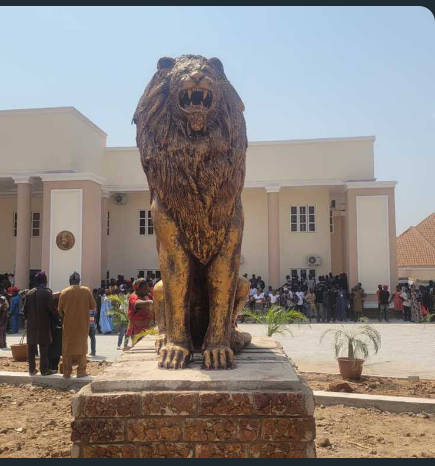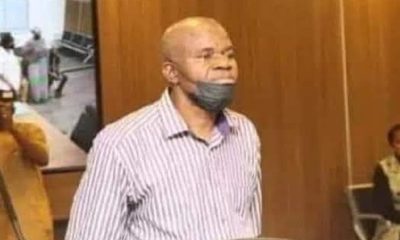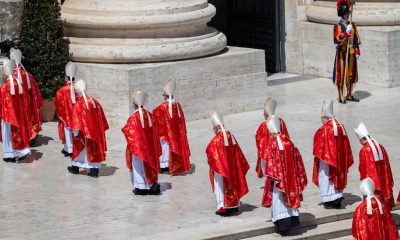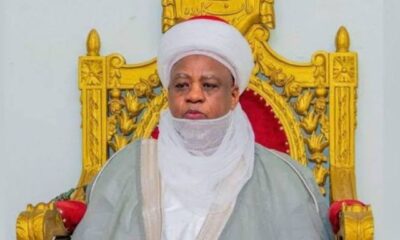Opinion
THE GREAT IWUDE IJESA FESTIVAL: WE MAY EMULATE, BUT NOT REPLICATE OR COPY ‘OJUDE OBA’.

By Omole Oluwasegun
Culture is viewed and known as the way of life of a particular set of people, the ideas, customs, and social behaviour of a particular people or society. It is the code of manners, language, religion, rituals, values, symbols and arts passed down from generation to generations.
A people can thus be identified or identify themselves through their culture, learned and shared through one generation to the other.
Akin to culture is the cultural tradition of a particular set of people, which refers to the inherited, established, or customary pattern of thought, action, or behavior.
This brings me to the important issue of the recently concluded “OJUDE OBA” of Ijebu Ode, and with respect to the Great IWUDE IJESA FESTIVAL which is celebrated annually by the people called, IJESAS. A lot of people carried away by the hyped dress-mode and costumes by the participants at ‘OJUDE OBA’ have been suggesting and calling on the organizers of IWUDE IJESA to begin to copy or duplicate the activities of OJUDE OBA.
The OJUDE OBA is not a traditional festival like, OLOJO, ILE IFE;
KIRIJI FESTIVAL, IMESI;
OSUN OSOGBO, OSOGBO;
IWUDE IJESA, ILESA and so on.
OJUDE OBA is celebrated in honor of Oba Awujale Ademuyewo Afidipotemole who gave a slave called Alli-Tubogun the permission to practice Islam in public space and without obstruction, molestation or fear of persecution. OJUDE OBA is therefore, most unlike the aforementioned Traditional Festivals which are celebrated in honour of certain Deities and gods to show their values and how their worshippers rate them. There’s no cogent cultural or traditional significance associated with OJUDE OBA besides the extravagant and intensive publicity and promotion of Yoruba Dress Code otherwise known as Aso-Ebi.
In the case of IWUDE IJESA, OWA Obokun Adimula, the paramount King and Ruler of IJESALAND is the Chief Celebrant and the Chief Host. Unlike, OJUDE OBA where Awujale is invited to witness social activities and Sallah Entertainments by different age groups and families in exotic Yoruba costumes as well as pageantry music and dances, IWUDE IJESA FESTIVAL is led by OWA OBOKUN ADIMULA himself and almost every traditional ruler in IJESALAND has a role or more to perform in the historic 30 days age long traditional and cultural activities.
In IWUDE IJESA FESTIVAL, it’s the people, Ijesa sons and daughters together with their friends that gather to witness the exotic, unique and amazing Yearly Royal Parade by Owa Obokun of IJESALAND, not just dancing, but performing Traditional and Cultural functions within specific towns, and homes in IJESALAND and ILESA. He will offer “IWURE”, that’s core traditional prayers, pay routine homages to the Courtyards of Yeye rise, Obaala, SAWE, Lejoka and Salatun in evidence of our unique heritage and our touch of sophistication. Each courtyard has a significant role in IWUDE IJESA FESTIVAL. Yeyerise is the Head of the Women and her courtyard is Owa’s first place to visit. At Obaala Courtyard, OWA has a role to play in honor of OWA OBOKUN, OWARI. At SAWE ILESA Courtyard in Ijamo, OWA is received by Eminent Ijesa sons and Daughters, and to a befitting reception and entertainment. Lejoka is the Chief of Defence Staff in IJESA military tradition, and there in his Courtyard, Owa Obokun will observe another pact by Ijesa warlords with OWARI to show and reaffirm the absolute submission and loyalty of the Ijesa military force to the authority of OWA OBOKUN ADIMULA. A mock battle is usually held between Lejoka and Loro, the Head of OWA OBOKUN Defence Corps as part of the rituals.
At Salotun Courtyard, Owa Obokun is transformed into “ORISA”, he changes into the Traditional Dress of his Fathers, wears the Original Crown from the cradle and mounts podium to Pray and Bless the people, IJESALAND, Osun State and Nigeria.
It’s important to state that a month, each year is dedicated to celebrate IWUDE OGUN which transformed to IWUDE IJESA FESTIVAL. Ogun is a Pathfinder and God of iron. It’s a deity that is very crucial to IWUDE CELEBRATIONS, as the history of IJESAS is linked to Ajibogun Onida Arara, the most accomplished son of Oduduwa, the progenitor of Yoruba Race. Ijesas are undisputed warriors that never suffered any defeat or enslaved in any circumstance.
The sword 
Apparently, people of IJESALAND are all involved in IWUDE IJESA FESTIVAL. From Ipole to Obokun; from Igbadae to Lemodu; from Ipetu to Ijebu Jesa; from Esa Oke to Imesi; from Erin Ijesa to Iloko, all over IJESALAND the significance of IWUDE IJESA FESTIVAL cannot be overrated.
The Grand Finale is merely the gathering of Ijesa sons and daughters as well as special guests at the ADIMULA Square to celebrate IWUDE IJESA with OWA Obokun and all the Obas as well as Chiefs in IJESALAND. At this gathering, different societies, cults and clubs are given special recognitions and spaces for Entertainments. They come in different Aso Ebi too. The unique difference between the gathering of Ijesas at Adimula square and the gathering of Ijebus at OJUDE OBA is the age groups arrangement and their extravagant display of dresses as their identities. In the IWUDE affairs, the protocol is exceptional, unique and superb. From First Class Traditional Rulers, Loojas, High Chiefs, Chiefs, Representatives from towns and villages, clubs, societies and organisations, each come to pay homage to Kabiyesi, Owa Obokun Adimula in sequences.
Chief Afolabi Igbaroola and his team at the IWUDE IJESA Planning Committee have been making careful efforts at involving or introducing the age groups idea, but in such a way that the essence of IWUDE IJESA FESTIVAL will not be bastardized or adultrated.
It might therefore be practically unwise to replicate OJUDE OBA in IWUDE IJESA without giving due considerations to the cultural or traditional differences between the Ijesas and the Ijebus, and without giving due diligence to the backgrounds of the IWUDE IJESA against the backgrounds of OJUDE OBA. So far as it is, the two events are not related in anyway, the participants are not the same in so many ways traditionally, so also the audience.
We as Ijesas have our own pride, our prejudices and our touch of honor, we are like the Oyos, who will not copy others lifestyles….”a ji se bi oyo laari, oyo o ki n se bi enikookan”. We are Omo OWA and therefore, should maintain our basic cultural heritage, practice it in the ways and manners it was handed over to us from ages past. If we have to bring in modern ideas, it must be carefully assessed and selected as not to destroy the intrinsic and extrinsic values, visions and missions of our own customs and traditions.
To this end, every age group wishing to participate in IWUDE IJESA should be made to contact the IWUDE Secretariat with valid constitution which spells out the activities of such group, its contributions to the development of IJESALAND, and the expected values the group may wish to add to our culture and tradition as well as the promotion of Tourism in IJESALAND.
The IWUDE Secretariat must do a thorough job at scrutinizing such age groups and ensure they meet certain criteria for registration.
Omole Oluwasegun, Omo-Osodi
Write from Ilesa, Osun State
omoleadeyemi@gmail.com
Opinion
THOUGHTS ON CONSTITUENTS DEVELOPMENT IN OBIO-AKPOR

BY BOLAJI AFOLABI
Democracy, generally described as the best form of government is anchored on three planks; the executive, legislature, and judiciary. In any nation that practices democratic government, each of these arms exists, functions, and operates independently but they relate with one and another; where necessary for the general well-being of the society. Indeed, the legislature can be described as the fulcrum of democracy. Without it, there is no democratic governance. In Nigeria, the legislature is saddled with the responsibilities of Law making; Oversight, and Representation. In the constitution (as amended), Section 4 gives the legislature the power to make laws for peace, order, and good government of the Federation or any part thereof. Sections 88 and 89 empowers the legislature to ensure that there is transparency, accountability, and good governance in Nigeria. Though not explicitly stated, Sections 51, 66, and 4 collectively imply that legislators are elected to serve the interests of their constituents; addressing the needs of their people through constituency representation.
Somehow, the majority of people who are constituents of legislators do not bother about their law making, and oversight functions. The focus seems to be constituency representation. On a regular basis, with audacious demands, and ferocious requests, legislators are bombarded by their constituents. It has gone terribly bad that many people are either entirely oblivious of the main duties of legislators or deliberately play “deaf and dumb.” Legislators, are mostly rated by “what they bring back home” by way of constituents empowerment and constituency development. Law making and oversight; which are their main duties, is gradually edged to the backwaters. Sadly, the wrong characterisation of the legislature is on a free fall. Given the vagaries of national challenges including monstrous hunger; pervasive hardship; disabling unemployment; accentuating insecurity; corrosive poverty, and more the legislators are at the receiving ends of their constituents. Oftentimes harassed, blackmailed, and subjected to different theatrics and tantrums, some legislators stretch out of their “terms of reference” to be free from barrages of attacks, vilification, and insults hauled by some constituents.
December, being the last month in every year is reputed for festivities and celebrations. Across the country, days of the month witness various merriment and programmes. From weddings to house warming and burial ceremonies and numerous other events, there are always something or the other that make people coalesce at centres and venues. Politicians, particularly elected are not left out. Leveraging on the mass-movement of people from the urban centres to rural communities, politicians organize one thing or the other that will benefit their constituents and constituencies. During this period, particularly in the Southern zones and Middle Belt, constituents regal in enthusiasm and ecstasy as they warmly jubilate over the commissioning of projects, distribution of materials, and provision of services from legislators. Commonly described as dividends of democracy, for many constituents it is seen as visible proof that they are being represented effectively by their respective legislators.
In most cases, the thrills, frills, and fun literally dry out as the yuletide season grinds to a halt. For many people, including legislators the first three months of the new year are times for reality check. Many explore the first quarter as months for recovery, recuperating, and rearranging themselves. Though many constituents may pretend to be oblivious of this “home-truth” but few reasonable ones do not expect interventions from their legislators anytime soon. Sadly, legislators, being the “government” that constituents can easily relate with, are daily bombarded by tonnes of requests. Every attempt to explain their inadequacies are roundly rejected by many people. Perhaps, one may not blame Nigerians. Overtime, the ostentatious, expensive, and expansive lifestyles of some legislators have led to collateral damage for few others.
Without prodding and pressures, the reverse is the case in the Obio-Akpor federal constituency. Literally, the rains have continued to fall on the constituents. Since the first few days of the year up till now, there has been a deluge of programmes and projects; facilitated by their representative, Chinda Kingsley geared towards communal development and the personal growth of constituents. According to verifiable records, Chinda, who has been impacting constituents since 2011, continued in the same positive trajectory. Recall that from mid-2023, many people from across different communities in the 17 Wards of the constituency have benefitted from various initiatives. These non-partisan, all-inclusive, and fair-to-all intervention programmes, with special focus on education, health, agriculture, skills development, and more have largely impacted the people. Mr. Ephraim Nedum, a serial entrepreneur confessed that, “initially, I didn’t believe all the talks about intervention programmes in the first quarter of the year. After proper checks, and confirmation from some beneficiaries within my neighborhood, I will like to commend Chinda for keeping to his word. He is a man of honour and integrity.”
Conscious of the imperatives of education to the totality of human existence, particularly in a cosmopolitan setting like Obio-Akpor, an adult education scheme was initiated. For weeks, both illiterate and semi-literate constituents; including elderly men and women, and others were exposed to the basic rudiments of learning. From testimonies, the programme had far-reaching impacts on the beneficiaries. Mr. Godwin Ibe, a trader explained, “though I didn’t continue my education after junior secondary school, the programme was very useful and timely for me. I have decided to write WAEC, and NECO next year.” To improve capacity building, about 150 teachers have been enrolled for the University of Buckingham (UOB) International Diploma of Education programme. One of the beneficiaries, Mr. Darlington Goodness admitted that, “this is a laudable initiative, as one is going to have global certification at the end of the programme. The benefits are immeasurable.” In continuation of the distribution of desks, teachers tables, and other equipment, Comprehensive Secondary School, Rumuokwurusi, Community Boys Secondary School, Elelenwo, and other secondary schools benefitted from the Phase 3 of the programme which ended a few weeks back.
Cognizant that the growth of the informal and semi-formal sectors are necessary for the promotion of trade and commerce, as well as realistic economic growth in the constituency, and Rivers, diverse training programmes were facilitated. Many people, including indigenes, residents, and non-indigenes participated in various capacity building initiatives in agriculture, transportation, welding, and other vocations. Many of whom got buses, working materials, start-up packs, and other empowerment packages. Mr. Nurudeen Ambali a commercial bus driver was surprised that, “non-indigenes were not only included in the training programme but few also benefitted from the buses.” Mallam Jubril Mohammed, Hausa community leader, affirmed that, “in my over three decades in Rivers, this is the first time that our people are benefitting largely from programmes initiated by any lawmaker.” Comrade Destiny Fynecountry, a Youth Leader emphasized that, “the AgriBusiness capacity building programme was an eye-opener, and life-changing experience for youths. We now know the extensive value of chain opportunities and possibilities in the sector.” Corroborating, Ms. Magdalene Wakama reiterated that, “for many of us, we have started our respective journeys towards being self-reliant, and emerging as agriculture entrepreneurs.”
Mindful about the glaring healthcare deficits in various communities, and the challenges the government is facing towards addressing this all-important sector, Chinda facilitated a three-day free medical outreach. The programme was not restricted to constituents but also included people from contiguous communities. Elderly men and women, nursing mothers, youths, and others had interactions, and treatments on various health issues which were anchored by quality, and experienced medical professionals. Mr. Valentine Dominic, applauded the initiative, “though I am not from the PDP but Chinda should be commended for insisting that everybody benefitted from the medical outreach. Fact is, I know many people who are members or supporters of rival political parties that participated.” For Elder Kevin Nedum, “I am very happy that, in my lifetime I am benefitting from a medical outreach. The ease with which I was invited to the programme, examined by doctors, and given recommended glasses shows that good things can be done if the right people are elected to offices.” Madam Philomena Emele declared that, “with proper checks, and provision of medications, I am experiencing improvement in the health challenges that I had before now.”
Somehow, there is a unanimity of opinion within the Obio-Akpor federal constituency, and across neighbouring communities that Chinda has done well. Similar endorsements are echoed in some other areas across the state. That these commendations are broad-based; across party lines, ethnicity, religion, and different persuasion speaks volumes about the all-embracing impacts of these interventionist programmes. Chief Chidera Obiozor, a community leader stressed that, “it is heart warming that he has given life to his campaign promises which was anchored on ‘I Win, You Win.’ One hopes that he will continue with this, and more.”
For Mrs. Queen Chiazom, an opposition party women leader, asserted that, “the various programmes are adding value to the people of the constituency, irrespective of party affiliation. I was happy when I heard that Chinda always insists that these programmes are for everybody. This is the type of leader that people desire.” Indeed, Rivers has been fortunate with the calibre of legislators they have at the National Assembly. From available records, their commitment to constituency development, and constituents empowerment has been encouraging. Amidst the positive narratives, and commendations, people are hopeful that Chinda (and other legislators) will keep the rain of performances falling.
* BOLAJI AFOLABI, a Development Communications specialist was with the Office of Public Affairs, The Presidency, Abuja.
Opinion
CBN under Cardoso and $6.83 Billion balance of payments surplus in 2024 that signals economic resurgence

By Ibrahim Modibbo
Since his appointment as the Governor of the Central Bank of Nigeria, in October 5, 2023, Olayemi Cardoso has continue to bring on board wide-range of macroeconomic reforms, stronger trade performance, and renewed investor confidence in Nigeria’s economy, that were aimed at putting the country back to its economic footing, as a strong economy that is second to none in Africa.
As part of the ongoing reforms, the Central Bank of Nigeria recently announced a Balance of Payments (BOP) surplus of $6.83 billion for the 2024 financial year, marking a decisive turnaround from deficits of $3.34 billion in 2023 and $3.32 billion in 2022, according to a press statement from Mrs Sidi-Ali, Hakama, the Ag. Director, Corporate Communications of the apex bank.
CBN says “the current and capital account recorded a surplus of $17.22 billion in 2024, underpinned by a goods trade surplus of $13.17 billion. Petroleum imports declined by 23.2% to $14.06 billion, while non-oil imports fell by 12.6% to $25.74 billion. On the export side, gas exports rose by 48.3% to $8.66 billion, and non-oil exports increased by 24.6% to $7.46 billion.”
While “remittance inflows remained resilient, with personal remittances rising by 8.9% to $20.93 billion. International Money Transfer Operator (IMTO) inflows surged by 43.5% to $4.73 billion, up from $3.30 billion in 2023, reflecting stronger engagement from the Nigerian diaspora. Official development assistance also rose by 6.2% to $3.37 billion,” the statement added.
Nigeria recorded a net acquisition of financial assets totalling $12.12 billion. Portfolio Investment inflows more than doubled, increasing by 106.5% to $13.35 billion, while resident foreign currency holdings grew by $5.41 billion, indicating stronger confidence in domestic economic stability. Although foreign direct investment fell by 42.3% to $1.08 billion, the overall financial account posted notable gains.
The country’s external reserves increased by $6.0 billion to $40.19 billion by year-end 2024, bolstering its external buffer.
Notably, net errors and omissions narrowed significantly by 79.5% to negative $5.10 billion in 2024, down from $24.90 billion in 2023, reflecting substantial improvements in data availability and capture. This represents a major advance in data accuracy, transparency, and overall reporting integrity.
The 2024 BOP surplus highlights the effectiveness of Nigeria’s ongoing reform agenda. The liberalisation and unification of the foreign exchange market, a disciplined monetary policy approach to managing inflation and stabilising the naira, and coordinated fiscal and monetary measures have all contributed to enhanced competitiveness and investor sentiment.
“The positive turnaround in our external finances is evidence of effective policy implementation and our unwavering commitment to macroeconomic stability,” said the Governor of the Central Bank of Nigeria. “This surplus marks an important step forward for Nigeria’s economy, benefiting investors, businesses, and everyday Nigerians alike,” the statement further noted.
Other notable indicators to building strong economy by this policy include but not limited to a stronger trade performance, particularly in the current and capital accounts, with a surplus of $17.22 billion in 2024, has contributed to the balance of payments surplus. A goods trade surplus of $13.17 billion that will further strengthens the positive trend. The decline in petroleum and non-oil imports also contributes to a more favorable trade balance.
It will noteworthy to note that the CBN’s reforms have increased investor confidence, leading to higher foreign portfolio investment inflows. Portfolio investment inflows more than doubled in 2024, reaching $13.35 billion. This influx of capital indicates a stronger belief in the stability and growth prospects of the Nigerian economy.
The apex bank’s disciplined monetary policy and FX market reforms on the other hand are aimed at managing inflation and stabilizing the Naira, has contributed to a more stable financial system.
The liberalization and unification of the foreign exchange market have led to greater transparency and reduced distortions in the market.
The implementation of an Electronic Foreign Exchange Matching System (EFEMS) further enhances transparency and efficiency in the FX market.
The reforms, including the unification of the exchange rate, have improved Nigeria’s competitiveness and attracted more foreign investment. Testament to this is the clearing of a $7 billion forex backlog which has also boosted the country’s image with foreign investors.
Also, the significant improvements in data availability and capture have led to a marked reduction in net errors and omissions in the balance of payments data. This enhanced data integrity provides a more accurate picture of the country’s economic performance and builds trust with stakeholders.
In conclusion, the combination of strong trade performance, renewed investor confidence, disciplined monetary policy, and improved data integrity, all facilitated by the CBN’s wide-ranging reforms, are key indicators of Nigeria’s economic resurgence. These developments demonstrate the positive impact of the reforms on the nation’s external finances and overall economic stability.
Dr Moddibo, a public analyst, wrote in from Abuja
Opinion
CBN leads financial dialogue with JP Morgan, NGX, others, in pre-spring meetings Forum

By Dr. Ibrahim Modibbo
In anticipation of the International Monetary Fund (IMF) and World Bank Group (WBG) Spring meetings which commenced on Monday, April 21, 2025, the Central Bank of Nigeria (CBN) partnered with J.P. Morgan, the Nigerian Exchange Group (NGX) and Africa Private Capital Association (AVCA) to host a high-profile global forum at Nasdaq MarketSite in New York on Thursday, April 17, 2025, according to press statement by Dr Ibrahim Moddibo.
The forum, titled “The Nigeria Investment Agenda: Pathways for Growth & Global Partnerships,” convened global investors, diaspora leaders, and senior financial stakeholders to examine Nigeria’s macroeconomic prospects and ongoing reform progress.During his commanding address, Governor Olayemi Cardoso outlined his comprehensive reform strategy encompassing monetary tightening, foreign exchange market transparency, and enhanced financial governance.
He emphasized that these initiatives are establishing the foundation for sustainable macroeconomic stability and heralding a new era of transparency and confidence.Governor Cardoso reaffirmed the CBN’s unwavering commitment to rebuilding credibility through orthodox monetary policy, transparency, and consistency.
“We inherited a crisis of confidence but chose a different path. We’re not turning back,” he stated decisively.In a powerful fireside chat between the Governor and Nobel Prize-winning economist Dr. James Robinson, Reverend Richard L. Pearson Professor at the University of Chicago, Governor Cardoso elaborated on his vision to reestablish the CBN as a credible, trusted institution – rooted in domestic excellence and respected internationally.Mr. Muhammad Sani Abdullahi, Deputy Governor for Economic Policy at the CBN, delivered a macroeconomic update highlighting sharp increases in foreign exchange turnover, emerging signs of disinflation, and strengthening external reserves. “With a market-determined exchange rate and a transparent, rules-based policy framework, confidence is gradually being restored in Nigeria’s economy,” he noted.
Welcoming participants to the forum, Dr. Nkiru Balonwu, Adviser to the CBN Governor on Stakeholder Engagement and Strategic Communication, framed the forum as a key moment in the Bank’s broader engagement strategy. “Today is more than a conversation,” she noted.
It’s about opening the books on the CBN’s transformation story under Governor Cardoso – sharing the facts, interrogating the progress, and looking ahead together at what more can be done to build sustainable partnerships and unlock long-term capital,” she explained.
Another key highlight of the event was the panel discussion entitled “Repricing Nigeria: Assessing the Scope for Sustained Change.” Moderated by Gavin Serkin, Founder of New Markets Media & Intelligence, the panel featured global financial luminaries: Joyce Chang, Chair of Global Research at JPMorgan Chase; Jason Rekate, Global Co-Head of Corporate Banking at Citi; Razia Khan, Chief Economist for Africa & Middle East at Standard Chartered; and Ahmad Zuaiter, Co-Founder & CIO of Jadara Capital Partners. Each panelist provided expert perspectives on Nigeria’s investment landscape, noting renewed international interest driven by improved fundamentals, strengthened governance, and clearer policy direction.
The CBN Board and Monetary Policy Committee were represented by US-based diaspora members Mr. Robert Agbede, Prof. Melvin Ayogu, and Dr. Aloysius Ordu, underscoring the Bank’s global engagement and commitment to leveraging Nigerian talent worldwide. Temi Popoola, Group CEO of NGX, moderated the Q&A session, while Dr. Olubukola Akinniyi Akinwunmi, Director of Banking Supervision at CBN, delivered the closing remarks.The forum focused on substantive discussions and future prospects: engaging critical voices, evaluating progress, and identifying requirements for building lasting partnerships and attracting long-term capital. Central to this endeavor is a clear objective: reestablishing the CBN as a credible, trusted institution respected globally and dedicated to excellence at home.
Dr. Ibrahim Modibbo, a public affairs analyst writes from Abuja.
-

 News8 hours ago
News8 hours agoCourt dismisses Emefiele’s bid to reclaim forfeited 753 duplex estate
-

 News23 hours ago
News23 hours agoBreaking: Late gospel singer Osinachi’s husband sentenced to death by hanging
-

 Metro8 hours ago
Metro8 hours agoWanted CBEX promoter surrenders to EFCC
-

 Opinion4 hours ago
Opinion4 hours agoTHOUGHTS ON CONSTITUENTS DEVELOPMENT IN OBIO-AKPOR
-

 News22 hours ago
News22 hours agoVatican: Conclave to elect a new pope will start on May 7
-

 Politics9 hours ago
Politics9 hours agoPDP Calls Emergency Session as Top Members Flee to APC
-

 Education20 hours ago
Education20 hours agoWAEC, NECO set to begin computer-based exams in 2026
-

 News22 hours ago
News22 hours agoSultan declares Tuesday first day of Zulki’ida 1446AH






